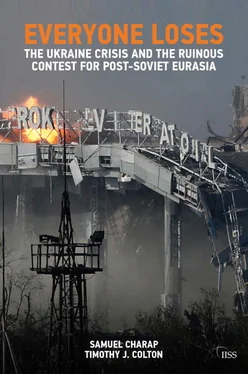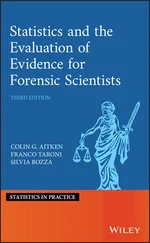One of the ironies of recent frictions is that at this juncture neither NATO nor the EU is in a position to offer full-scale membership to any of the In-Betweens. This would be the case even if there were no frozen conflicts in the region, and even if the In-Betweens met the standards of good governance, functioning markets and democratic practices required for either EU or NATO membership. NATO member states are at odds on extending security guarantees to countries that Russia habitually threatens and sometimes invades. The EU is in the deepest crisis of its existence, given the eurozone mess, economic torpor, unruly waves of migration from the Middle East and North Africa, terrorism and Brexit. With its survival in question, adding new members is not a priority.
Recognising the reality that the policy of institutional enlargement in post-communist Europe and Eurasia, its past successes aside, has run its course does not mean that the West must accept Russian domination of its neighbours. In fact, the further enlargement of Russia-led institutions in the region is not a plausible solution either, regardless of what policy the West adopts. Those already in the Russian institutional fold remain there either under duress or for lack of better options; most would likely run for the exits if they could. [58] The ever-increasing economic role of China in post-Soviet Eurasia implies that the Russia–West binary of external patrons is already a thing of the past. We are grateful to Fyodor Lukyanov, Chairman of the Moscow-based Council on Foreign and Defence Policy, for this point.
There is little support anywhere else for the Russian blueprint for regional governance.
Western and Russian policymakers would also be well advised to rethink the geo-ideas that often underpin their policies. It is not tenable for the West to insist on the right of all countries to make their own choices while at the same time being unable or unwilling to grant them those choices (like NATO and EU membership) or to take responsibility for the consequences of choosing. The EU is poorly served by the pious assertion of normative hegemony – the inherent superiority of its systems and structures – in an area where that hegemony is contested, both by Russia and by the reform-allergic systems of the In-Betweens. [59] Hiski Haukkala, ‘A Perfect Storm; Or What Went Wrong and What Went Right for the EU in Ukraine’, Europe–Asia Studies , vol. 68, no. 4, June 2016, pp. 653–64.
Russia’s concept of indivisible security often boils down to a yearning for an accord among great powers, Yalta-style, that would reinforce rather than remove divisions in the region. Such a deal would not work even if it were agreed to, which it will not be. The Kremlin’s idée fixe that Russia needs to be the leader of a pack of post-Soviet states in order to be taken seriously as a global power broker is more a feel-good mantra than a fact-based strategy, and it irks even the closest of allies.
The towel should also be thrown in on the geo-ideational shadow-boxing over the Russian assertion of a sphere of influence in post-Soviet Eurasia and the Western opposition to it. Would either side be able to specify what precisely they mean by a regional sphere of influence? How would it differ from, say, US relations with western-hemisphere states, or from Germany’s with its EU neighbours? Clearly there are differences, but they are rarely specified. Is it realistic to think that Russia, an order of magnitude weightier than the states at its doorstep, would have no influence over them? And is it reasonable to expect any country of Russia’s global significance to observe from the wings as geo-economic and geopolitical blocs closed to it gradually absorb many of the countries on its borders? As Charles Kupchan, who has served as the Obama administration’s senior National Security Council official for the In-Betweens, once wrote, ‘The United States would hardly sit by idly if Russia formed an alliance with Mexico and Canada and started building military installations along the US border.’ [60] Charles A. Kupchan, The End of the American Era: U.S. Foreign Policy and the Geopolitics of the Twenty-First Century (New York: Random House, 2007), p. 14.
Russia’s insistence that the In-Betweens and the Central Asians constitute its sphere of influence, or its zone of ‘privileged interests’ as Dmitry Medvedev put it, is as devoid of meaning as the fervent Western refutation of it. What exactly are privileged interests? Is the privilege asserted absolute, relative or at the margin? Is Russia truly claiming that it alone will have final say in the area, and would its writ be only over national security or also over domestic government, social policy and so forth? Are the ways the Kremlin chooses to exercise its influence not as important as the fact of influence itself? What would Moscow presume to do about the preferences of the states in this ‘sphere’, and especially those that have since 1991 sought alternative partnerships to balance against the regional hegemon? Even if Western leaders were to shed their qualms and seek a grand bargain with Russia, can any deal that might result really function if it does not take these countries’ views into account?
Breaking the taboo on open-ended, precondition-free dialogue on the regional order is the essential first step if we are to mitigate the ruinous geopolitical, geo-economic and geo-ideational competition and end the Russia–West confrontation that has reached such dangerous levels in recent years. For the West, allowing the ghosts of Yalta to stand in the way of such a conversation with Russia is negligent and in the final analysis self-defeating. For Moscow, it is untenable to expect that its neighbours can be forever excluded from a dialogue that will have direct implications for them.
Holding such talks in the current atmosphere of mistrust, mutual recrimination and fear-mongering will require a significant investment of political capital. And the process of moving beyond current adversarial approaches to the region and finding common ground will take time. For this process to succeed, all parties would also have to scale back their maximalist objectives and be prepared for compromises that will leave no one fully satisfied. The West needs to cease holding out for Russia to surrender and accept its terms. Russia must stop pining for the good old days of great-power politics, be it the Big Three of 1945 or the Concert of Europe of 1815–1914, and accept that its neighbours will have to have a say in any agreement that affects them. The neighbours should stop seeking national salvation from without, and recognise that it will be up to them, first and foremost, to bring about their countries’ security and well-being.
If such talks ever take place, they could consider new institutional arrangements for the In-Betweens that would serve as a bridge between the Euro-Atlantic institutions and their Russia-led counterparts. [61] This section draws on Samuel Charap and Jeremy Shapiro, ‘US–Russian Relations: The Middle Cannot Hold’, Bulletin of the Atomic Scientists , vol. 72, no. 3, April 2016, pp. 150–5.
Such an agreement would go a long way toward moving past the negative-sum game by both diminishing great-power rivalry in the region and alleviating some of the challenges faced by the In-Betweens. The following is a preliminary list of criteria the new arrangements would have to meet in order to do so:
• They must be acceptable to all concerned parties.
• Priority should be given for the foreseeable future to economic growth, reform and modernisation in the In-Between countries. The states in question should be allowed to pursue ties with both the EU and the EEU as they see fit, permitting multi-directional integration rather than insisting on obligations that make it impossible.
Читать дальше











